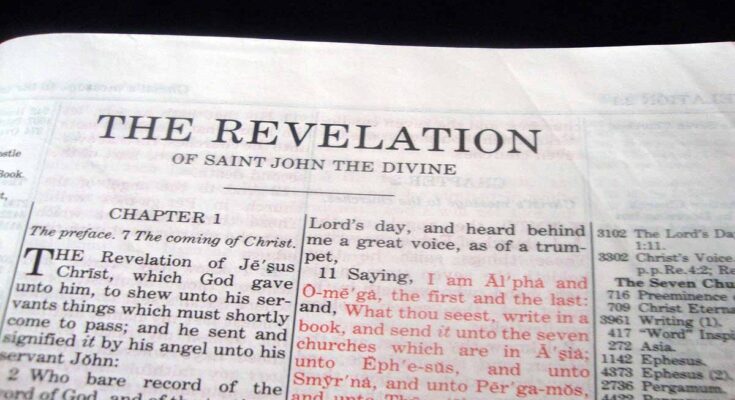Revelation
The Revelation John received opens with instructions for him to write to seven churches. He both commends them for their strengths and warns them about their flaws. Each letter was directed to a church then in existence but also speaks to conditions in the church throughout history. Both in the church and in our individual lives, we must constantly fight against the temptations to become loveless, immoral, lenient, compromising, lifeless, or casual about our faith. The letters make it clear how our Lord feels about these qualities.
This Revelation is both a warning to Christians who have grown apathetic and an encouragement to those who are faithfully enduring the struggles in this world. It reassures us that good will triumph over evil, gives us hope as we face difficult times, and gives guidance when we are wavering in our faith. Christs message to the church is a message of hope for all believers in every generation.
Writer of Revelation
The author identified himself as John. He was familiar enough with his readers to call himself their “brother and companion in tribulation.” He indicates that he was exiled to the island of Patmos off the west coast of Asia Minor (modern Turkey), and that on the “Lord’s Day” (Sunday?) he was caught up “in the Spirit” and saw the visions recorded in his book.
Date Written
The traditional date of the book means that the book of Revelation is after the fall of Jerusalem in AD 70 and the reign of Nero.
Preterist scholars make a case for an earlier date of the book because they view the book as primarily fulfilled in the fall of Jerusalem in AD 70 and in the reign of Nero. The traditional dating of the book is a problem for preterists because it puts the prophecies of Revelation after the events of AD 70.
While we should embrace sound scholarship regarding the dating of any book, it is important to see that the controversy over the date of the book of Revelation is usually based on whether you want to make the case that the book of Revelation is primarily fulfilled by the Roman Empire or whether it is a future reality. In other words, scholars typically have a theological bias that influences their desire to argue for an earlier date for the book.
To Whom Written
To “the seven ekklesias which are in Asia” (Revelation 1:4). Although delivered to the leadership of the dispersed Jews of John’s day, the fulfillment of the book is entirely in the distant future.
In his book, Approaching the Bible, Michael Penny placed the martyrdom of John (Matthew 20:23; Mark 10:39) in A. D. 61 or 62, shortly after Acts 28:28. Revelation could not have been the last book of the bible written, as that privilege was reserved for Paul (Colossians 1:24-26; II Timothy 4:6-7). Stories told about the late first-century “John of Ephesus” (who died at a very old age in his bed) are not consistent with the truths written by the martyred apostle John. We have no writings of the so-called John of Ephesus, and the stories about him came from Polycarp, who also left no writings. Thus, the stories were third-hand, from Polycarp’s disciple, Irenaeus, and later from Tertullian.
Purpose of Revelation
The purpose for the book of Revelation was to prophesy events that will be shown unto the servants of God living in a yet future dispensation. Aside from the introductory verses (1:1-9), Revelation is a book of prophecy concerning the Day of the Lord (including the later tribulation period, the 1,000-year parousia of Christ, and the “little season”) and then continuing on to the Day of God (the new heavens and new earth). It does not pertain to the current dispensation of grace or the coming Day of Christ (the kingdom of God that fulfills the prophecy of Daniel 9:24-27 and encompasses at least 500 years).
Theological Contribution of Revelation
The grand theme of the book of Revelation is that of two warring powers, God and Satan, and of God’s ultimate victory. It would be a mistake to consider the two powers as equal in might. God is stronger than Satan, and Satan continues his scheming plots only because God permits him to do so.
Special Contributions of Revelation
One of the unique characteristics of Revelation is its use of four, twelve, and seven. Among the examples, we find four living creatures, four horsemen, and four angels; twelve elders, twelve gates to the city of God, seven churches, seven seals, seven bowls. In apocalyptic literature, these numbers represent completeness and perfection. Conversely, 3 ½ is a number frequently associated with Satan; this number symbolizes a fracturing and diminishing of God’s unity. With this in mind, the 144,000 elect in chapter 7 should not be taken literally, but rather (12,000 times 12) stands for totality. This means that no martyr will fail to see God’s reward. The number of the beast, 666, probably refers to Nero, or more specifically to the idea that Nero would return alive to lead the armies of Satan against God.
Scripture Study Resources
ESV Study Bible – Study Bibles give you a deeper understanding of God’s Word with tools for life application like commentary, maps, charts, concordance, and study notes. Search our popular translations- NIV, ESV, NKJV, KJV and more!
Believer’s Bible Commentary: Second Edition – A Bible commentary is a written, systematic series of explanations and interpretations of Scripture. Commentaries often analyze or expound on individual books of the Bible, chapter by chapter and verse by verse. Some commentary works provide analysis of the whole of Scripture.
The New Strong’s Expanded Exhaustive Concordance of the Bible – The best concordance for word study! This exclusive new edition of a legendary classic puts generations of biblical research at your fingertips. A valuable tool for pastors, teachers, and students of the Bible.
Vine’s Complete Expository Dictionary of Old and New Testament Words – This classic word study resource allows you to study the meaning of biblical words in the original languages without spending years learning Greek or Hebrew. A great resource for students, seasoned pastors, and anyone who enjoys biblical word studies–even if they have little to no formal training in Hebrew or Greek.
Halley’s Bible Handbook – The beloved and classic Bible companion has been thoroughly updated, while retaining its time-honored features and Dr. Halley’s highly personal style, to offer even greater clarity, insight, and usefulness.
Click here to print or download the scripture out line “Revelation: Because the Time is Near“




